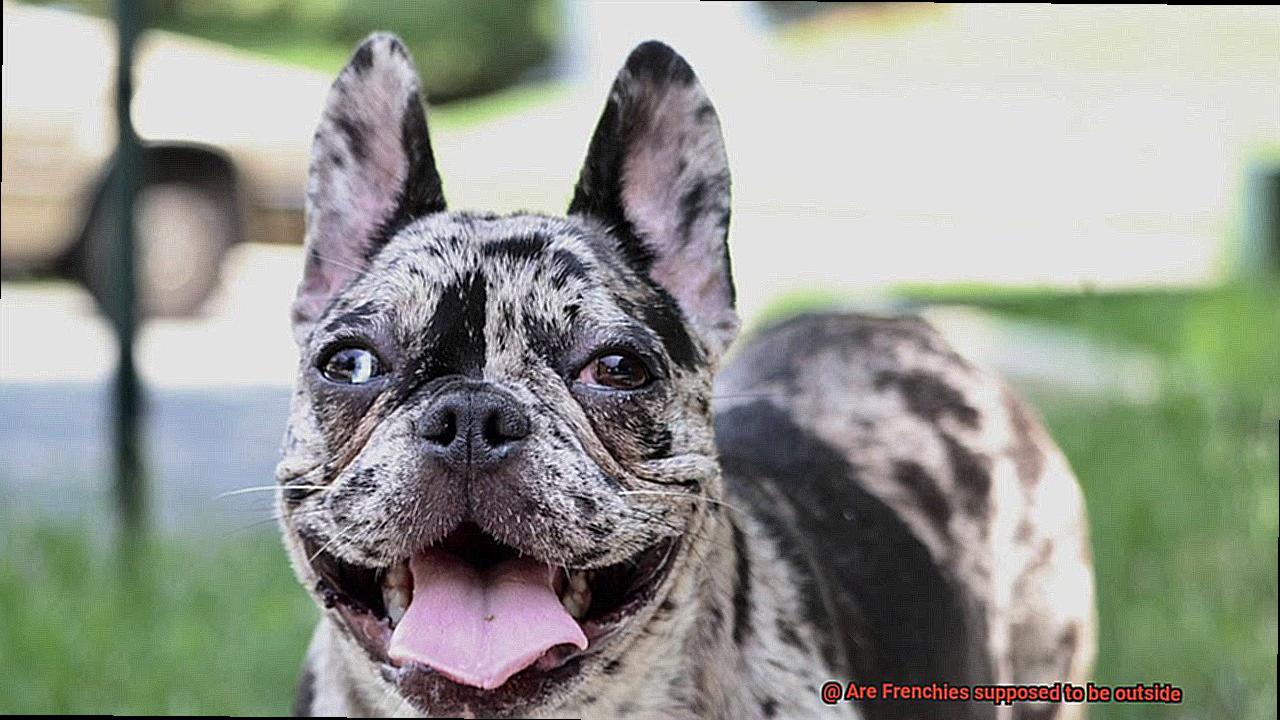Are Frenchies supposed to be outside?
These lovable little creatures have captured the hearts of dog enthusiasts worldwide with their unique looks and charming temperaments. But when it comes to their ideal living environment, there’s a lingering question: should Frenchies be kept outside?
In this blog post, we embark on a quest to unravel this age-old query and provide you with insights into the best living arrangements for these delightful companions. Whether you’re already a proud Frenchie owner, thinking of becoming one, or simply curious about canine care, we’re here to explore the great indoors versus outdoors debate. By combining expert opinions with scientific findings, we aim to help you make an informed decision.
So, grab your favorite beverage and get ready to dive into the fascinating world of French Bulldogs’ living preferences. After all, ensuring the happiness and well-being of our furry friends is an essential part of being a responsible pet owner.
The Debate of Keeping Frenchies Indoors or Outdoors
Contents
- 1 The Debate of Keeping Frenchies Indoors or Outdoors
- 2 Understanding the Anatomy of a Frenchie: Brachycephalic Breeds
- 3 Climate Considerations for French Bulldogs Living Outdoors
- 4 Securing an Outdoor Area for Your Frenchie
- 5 How Much Time Should a Frenchie Spend Outside?
- 6 Potential Health Risks of Keeping Frenchies Outdoors
- 7 The Benefits of Keeping Frenchies Indoors
- 8 Grooming and Veterinary Care for French Bulldogs
- 9 Conclusion
French Bulldogs, also known as Frenchies, are adorable and affectionate companions. As a proud Frenchie owner, you may find yourself pondering the age-old question: should my furry friend be an indoor or outdoor pet? In this article, we will delve into the debate of keeping Frenchies indoors or outdoors, weighing the pros and cons to help you make an informed decision that best suits your Frenchie’s needs.
Indoor Bliss:
- Safety first: Frenchies have unique brachycephalic features that make them prone to heatstroke and respiratory issues. It’s crucial to protect them from extreme temperatures by keeping them indoors, where you can control the climate.
- Companionship is key: These social butterflies thrive on human interaction and yearn to be part of your family activities. By keeping them indoors, you provide them with constant love, attention, and companionship that they crave.
- Accident prevention: Despite their playful nature, Frenchies are vulnerable to injuries from falls or encounters with larger animals. By keeping them indoors, you minimize the risk of accidents and ensure their safety.
Outdoor Adventures:
- Exercise is essential: French Bulldogs benefit from regular physical activity to maintain a healthy weight and overall well-being. Outdoor time allows them to indulge in walks and play sessions that provide much-needed exercise.
- Mental stimulation: Fresh air and outdoor activities provide mental stimulation for your Frenchie, preventing boredom and destructive behaviors that may arise from being cooped up indoors.
- Precautions are paramount: If you decide to let your Frenchie venture outdoors, make sure they are supervised at all times. Provide shaded areas, fresh water, and a secure environment to avoid overheating or potential dangers.
Understanding the Anatomy of a Frenchie: Brachycephalic Breeds
French Bulldogs, with their cute flat faces and playful personalities, have become increasingly popular as household pets. However, their unique anatomy poses challenges when it comes to outdoor living. In this article, we will delve into the anatomy of French Bulldogs and other brachycephalic breeds to understand why they may not be well-suited for outdoor adventures.
Brachycephalic Skull Structure:
French Bulldogs have a brachycephalic skull structure characterized by a short and wide skull shape. This distinctive feature affects their airways, making it difficult for them to breathe properly, especially during physical exertion or in hot weather. The compressed airways can lead to respiratory distress, putting these breeds at risk of overheating and heatstroke.
Narrow Nostrils:
Stenotic nares, or narrow nostrils, are common in brachycephalic breeds like French Bulldogs. This condition restricts airflow, making it harder for them to pant and regulate their body temperature. When exposed to high temperatures or strenuous activities outdoors, they are more prone to overheating and heat exhaustion.
Elongated Soft Palate:
Another anatomical characteristic of brachycephalic breeds is an elongated soft palate. The soft palate is the tissue at the back of the mouth that separates the oral and nasal cavities. In French Bulldogs, this tissue can obstruct the airway even further, leading to snorting, snoring, and heavy breathing. Engaging in outdoor activities can exacerbate these breathing difficulties.
Risk of Overheating:
Due to their compromised respiratory system and limited ability to cool themselves down through panting, French Bulldogs are more susceptible to overheating. They struggle in hot and humid weather conditions or when exposed to direct sunlight for prolonged periods. Heat exhaustion and heatstroke can occur rapidly, posing a serious threat to their health.
Climate Considerations for French Bulldogs Living Outdoors
Hot weather: Keep them cool and hydrated
- French Bulldogs are sensitive to heat due to their short-nosed structure.
- They are prone to heatstroke and should be kept indoors in hot climates.
- Provide plenty of fresh water and shade for your Frenchie if they must be outside.
Cold weather: Keep them warm and cozy
- French Bulldogs have a thin coat and minimal body fat, making them susceptible to the cold.
- Provide a warm and insulated shelter for your Frenchie if they need to spend time outdoors.
- Consider using doggy clothing like sweaters or jackets to keep them warm during walks.
Humidity: Be cautious in humid conditions
- High humidity can make it harder for French Bulldogs to regulate their body temperature.
- Watch for signs of heat-related illnesses and ensure they have access to shade and cool areas.
Extreme weather conditions: Always bring them inside
- French Bulldogs should never be left outside during storms, heavy rain, or snowstorms.
- These conditions can be dangerous for their health and safety.
Monitor your Frenchie closely
- Regardless of the climate, keep an eye on your Frenchie’s behavior and physical signs of discomfort.
- Excessive panting, lethargy, or shivering may indicate distress.
- Bring them indoors immediately if you notice any signs of discomfort.
Securing an Outdoor Area for Your Frenchie
French Bulldogs, with their adorable wrinkled faces and playful personalities, are beloved pets for many. While they are primarily indoor dogs, there are times when providing them with a secure outdoor area can be beneficial. In this article, we will discuss expert tips and advice on how to create a safe and secure outdoor space for your Frenchie to enjoy.
Assessing the Perimeter:
The first step in securing your outdoor area is to assess the perimeter. Check for any gaps or weak spots in your fencing that your Frenchie could squeeze through. Patch up holes and reinforce weak areas to prevent any potential escapes. Remember, even the smallest opening can be an invitation for a curious Frenchie to explore the world outside.
Choosing the Right Fencing:
When it comes to fencing, opt for solid or high materials that prevent Frenchies from jumping over or getting through. Avoid chain-link fences, as these can be easily climbed by agile French Bulldogs. Instead, choose materials like wood or vinyl that provide better security. Additionally, ensure there are no gaps at the bottom of the fence where your Frenchie could dig under.
No Toxicity Zone:
French Bulldogs have a knack for chewing on things, so it’s crucial to remove any toxic plants or substances within reach. Research common toxic plants and remove them from your outdoor area. Keep gardening chemicals and other potentially harmful substances out of your Frenchie’s reach to ensure their safety.
Designate a Potty Area:
Creating a designated potty area within the secured outdoor space can help with house training your Frenchie and minimize accidents. Use puppy pads, artificial grass, or gravel in this designated area for easy cleanup. Consistency is key when it comes to potty training, so always bring your Frenchie to their designated spot.
Shade and Shelter:
French Bulldogs are sensitive to heat and cold, so providing adequate shade and shelter is crucial. Create a shaded area where your Frenchie can rest and escape from direct sunlight. Consider using a doghouse or a covered patio area where they can seek refuge during inclement weather. Additionally, in colder climates, provide warm bedding or clothing to keep them cozy.
Maintaining a Clean Environment:
Regularly clean your Frenchie’s outdoor area to keep it free from debris. Remove sticks, rocks, or any objects that could pose a choking hazard or cause injury. French Bulldogs are prone to respiratory issues, so maintaining a clean environment is essential for their health and well-being.
Supervision is Key:
Lastly, never leave your Frenchie unattended in the outdoor area for extended periods. While they may enjoy some supervised time outside, they are generally better off indoors where they can be closely monitored and protected from potential dangers.
How Much Time Should a Frenchie Spend Outside?
French Bulldogs, or Frenchies as they are affectionately called, are known for their small size and low energy levels. While they may not require as much exercise as some other breeds, it is still important for Frenchies to spend some time outside each day to get fresh air, mental stimulation, and socialization. So, how much time should a Frenchie spend outside? Let’s break it down.
Factors to Consider
The amount of time a Frenchie should spend outside depends on various factors such as age, health, and individual preferences. Puppies, for example, may require shorter but more frequent outdoor sessions to burn off their excess energy and aid in their development. On the other hand, adult Frenchies typically need around 30 minutes to an hour of outdoor time each day for exercise and mental stimulation.
Weather Conditions
It’s essential to consider the weather conditions when determining how much time your Frenchie should spend outside. French Bulldogs are brachycephalic breeds, which means they have short muzzles and can have difficulty regulating their body temperature. Therefore, they should not be exposed to extreme heat or cold for extended periods of time.
During hot summer months, it is best to plan activities during cooler times of the day or provide shaded areas and access to fresh water. In colder climates, owners may need to limit outdoor time or provide appropriate clothing to keep their Frenchies warm.
Interactive Playtime and Socialization
In addition to exercise, interactive playtime with toys or games can be incorporated into outdoor sessions. This provides mental stimulation for French Bulldogs and helps keep their minds sharp.
Socialization is also crucial for Frenchies. Taking them to dog parks or arranging playdates with well-behaved dogs can help them build confidence and develop proper social skills.
Balancing Indoor and Outdoor Time
Ultimately, the key is to strike a balance between indoor and outdoor time for French Bulldogs. They should have enough time outside to meet their exercise and mental stimulation needs while also ensuring their safety and comfort.
Remember, French Bulldogs are primarily indoor dogs, so they should have a cozy and secure space indoors as well. This will be their main living area where they can relax, sleep, and spend quality time with their family.
Potential Health Risks of Keeping Frenchies Outdoors
French Bulldogs, or Frenchies, are adorable and lovable companions known for their unique appearances and affectionate personalities. As responsible Frenchie owners, it’s essential to understand the potential health risks associated with keeping them outdoors for extended periods. In this article, we’ll delve into these risks and provide valuable insights to help you ensure the well-being of your furry friend.
Heatstroke and Breathing Difficulties:
Due to their brachycephalic structure, French Bulldogs are more prone to heatstroke and breathing difficulties. When exposed to hot weather for prolonged periods, they may struggle to regulate their body temperature effectively. To prevent these issues, it’s crucial to provide access to shade, fresh water, and adequate ventilation while limiting outdoor time during peak heat hours.
Respiratory Problems:
French Bulldogs’ short snouts make them susceptible to respiratory problems. Outdoor allergens like pollen, dust, and mold can exacerbate these issues, leading to discomfort and breathing difficulties. To minimize the risk, consider keeping your Frenchie indoors during high pollen seasons or when air quality is poor due to pollution or nearby construction.
Cold Weather Hazards:
French Bulldogs have a low tolerance for cold temperatures due to their short coats and lack of a thick undercoat. Exposure to chilly weather without proper protection can put them at risk of hypothermia and frostbite. Ensure your Frenchie has a warm coat or sweater and limit outdoor time during frigid conditions.
Parasites and Disease Transmission:
Outdoor environments expose French Bulldogs to various parasites like fleas, ticks, and mosquitoes. These pests not only cause discomfort but can also transmit diseases such as heartworm, Lyme disease, or West Nile virus. Regular preventive measures like flea and tick treatments are crucial when keeping Frenchies outdoors.
Mental Well-being and Behavioral Issues:
French Bulldogs thrive on human interaction and companionship. Isolating them outdoors for long periods without adequate socialization can lead to anxiety, loneliness, and depression. Lack of mental stimulation and physical exercise can also contribute to behavioral issues such as excessive barking or destructive chewing. Ensure your Frenchie receives plenty of quality time indoors and engage in interactive play and training sessions.
Safety Concerns:
French Bulldogs are small-sized dogs that can be targeted by predators or larger dogs when left unsupervised outdoors. Additionally, unrestricted access to roads or busy areas increases the risk of accidents or injuries. Always provide a safe and controlled environment when your Frenchie is enjoying outdoor time, ensuring they are within sight and protected from potential dangers.
The Benefits of Keeping Frenchies Indoors
French Bulldogs, or Frenchies, are known for their adorable squished faces and affectionate nature. These small, lovable dogs make wonderful companions and are well-suited to indoor living. In this article, we’ll explore the benefits of keeping French Bulldogs indoors and why it’s the best choice for their health and well-being.
Protection from Extreme Temperatures
French Bulldogs have short snouts and flat faces, which makes them more susceptible to heat stroke and breathing difficulties. By keeping them indoors, you can protect them from extreme temperatures and ensure they have access to a climate-controlled environment. This is especially important during hot summer months when the heat can be overwhelming for these brachycephalic breeds.
Safer Environment
French Bulldogs are small dogs and may be targeted by larger predators if left unsupervised outside. Additionally, they can become prey to other animals or at risk of theft or escape if left unattended in an unsecured yard. Keeping them indoors provides a safer environment where you can closely monitor their activities and keep them protected.
Strengthening the Bond
French Bulldogs thrive on human companionship and enjoy being part of the family. Keeping them indoors allows for more quality time together and strengthens the bond between the dog and its owner. They are social dogs that crave attention and may suffer from separation anxiety if left alone outside for extended periods.
Minimize Exposure to Environmental Hazards
French Bulldogs have sensitive skin and can be prone to allergies or skin irritations caused by grass, pollen, or insects. Keeping them indoors helps minimize these risks and ensures they have a clean and controlled environment. Additionally, it reduces their exposure to toxic plants or chemicals that may be present in outdoor areas.
Prevent Accidents
French Bulldogs are not known for their swimming abilities, and their short legs make it difficult for them to navigate uneven terrains. By keeping them indoors, owners can prevent accidents such as drowning in pools or injuries from falls or rough terrains. This helps keep them safe and reduces the risk of costly veterinary bills.
Reduce Stress and Noise Pollution
The noise levels and pollution outside can be overwhelming for French Bulldogs, who have sensitive hearing. Keeping them indoors provides a quieter and more peaceful environment, reducing stress and potential health issues associated with noise pollution.
Easier Supervision and Training
Indoor living allows for easier supervision and training. French Bulldogs can be stubborn at times, but with consistent training and reinforcement, they can become well-behaved companions. Being indoors facilitates monitoring their behavior, making it easier to correct any undesirable habits or provide positive reinforcement.
Grooming and Veterinary Care for French Bulldogs
In this paw-some blog post, we’ll delve into the importance of grooming and veterinary care for our beloved French Bulldogs. These cuties require special attention to keep them looking fabulous and feeling their best. So, grab your berets and let’s dive in.

Brushing for a Fabulous Coat:
French Bulldogs may have short coats, but they still need regular brushing to keep them looking sleek and stylish. Grab a soft-bristle brush or a grooming glove to remove loose hair and prevent those pesky mats. Oh-la-la, your Frenchie will be turning heads in no time.
Gentle Grooming Products:
Our Frenchies have sensitive skin, mes amis, which means we need to be careful with the products we use. Opt for hypoallergenic dog shampoos that are gentle on their delicate skin. Say non to human shampoos or soaps as they can strip away natural oils and cause dryness. Keep those wrinkles fresh and clean.
Wrinkle Cleaning 101:
Ah, the adorable wrinkles of our French Bulldogs. But with great wrinkles comes great responsibility. Regularly clean between those folds using a damp cloth or a baby wipe. And don’t forget to dry thoroughly to avoid any unwanted bacteria partying in there. C’est magnifique.
Dental Care for Pearly Whites:
Our Frenchie friends may have short snouts, but that doesn’t mean they can skip dental care. Crowded teeth can lead to dental issues like tartar buildup and gum disease. Brush their teeth with doggy toothpaste at least two to three times a week. Oh là là, those pearly whites will shine bright.
Veterinary Care: Ooh La La.
Regular veterinary check-ups are a must for our French Bulldogs. They are prone to certain health conditions like brachycephalic syndrome and allergies. Keep an eye on their overall health and address any concerns promptly with your vet. C’est fantastique.
Vaccinations: Protection Mode On.
To keep our Frenchies healthy, vaccinations are crucial. Core vaccines like rabies, distemper, parvovirus, and adenovirus are a must. Non-core vaccines may also be recommended based on their lifestyle and location. And don’t forget those flea and tick preventatives. Protect your Frenchie from unwanted hitchhikers.
Bon Appétit: Nutrition is Key:
Proper nutrition is essential for our French Bulldogs’ well-being. Consult with your vet to determine the best diet based on their age, activity level, and specific dietary needs. A balanced diet will keep their coat shiny, immune system strong, and weight in check. Bon appétit, mon ami.
uGheu8189-E” >
Conclusion
French Bulldogs, affectionately known as Frenchies, thrive in the warmth and coziness of indoor spaces. These delightful little dogs revel in the company of their beloved humans, snuggling up on couches and beds for endless cuddles. With their sleek short coats that feel like velvet under your fingertips, they are more sensitive than most breeds when it comes to temperature extremes. The frigid cold or scorching heat can quickly become unbearable for these precious pups.
But it’s not just their silky fur that requires protection; it’s also their unique facial structure. Those adorable smushed noses that we find so endearing can unfortunately lead to respiratory issues if exposed to excessive outdoor elements. The combination of a compact airway and limited ability to regulate body temperature puts Frenchies at higher risk when left outside for prolonged periods.
To ensure the well-being of your Frenchie companion, providing them with a safe haven indoors is crucial. A cozy spot where they can bask in the warmth of your presence while enjoying all the creature comforts they deserve. Whether it’s lounging on plush pillows or curling up in a luxurious dog bed fit for royalty, these pampered pooches will thrive in an indoor setting that caters to their every need.
So, while French Bulldogs may enjoy the occasional outdoor adventure or a quick romp in the backyard, they are not meant to be permanent residents of the great outdoors. Their delicate nature and unique physical characteristics require a loving and protective environment indoors, where they can truly flourish and share their boundless love with their human companions.
Remember, your Frenchie is more than just a pet; they are a cherished member of your family.




